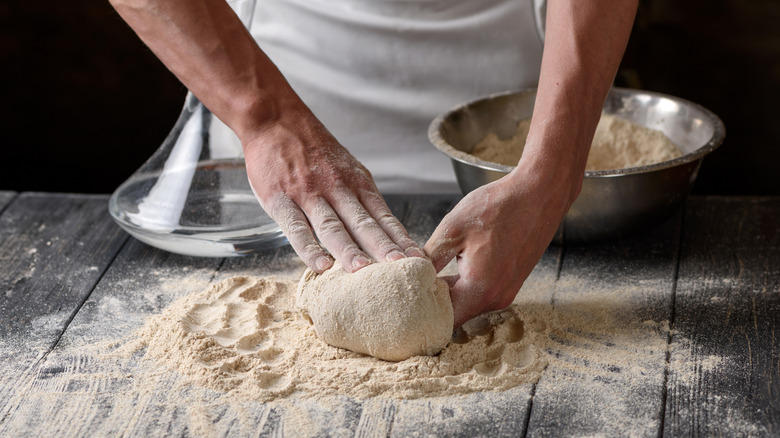The Biggest Mistakes People Make With Homemade Pizza Dough
From Shanghai to San Francisco, people want to learn how to make pizza dough from scratch. To learn the best practices and avoid common mistakes, we spoke with Serhan Ayhan, pizza consultant to Krave It, home of the Dubai chocolate dessert pizza. He revealed that the main problem with homemade pizza dough stems from a lack of patience rather than a lack of experience.
"One of the biggest mistakes often made when fermenting pizza dough includes using too much yeast," Ayhan tells Food Republic. "While the additional yeast will indeed cause the dough to rise quickly, it will be lacking in the flavor that would develop from a slower fermentation that gives the smaller amount of yeast more time to grow." Slow proofing, where yeast breaks down starches and proteins in the flour over 24 to 48 hours, produces more complex flavors. Without that extra time, the dough remain flavorless, harder to digest, and inelastic, causing it to tear when stretched.
"If you have the time, consider using yeast amounts that are no more than 1% of the total flour weight. A related big mistake is not allowing enough time for dough to build optimal flavor," Ayhan says. "Finally, not being familiar with the flour that you are using can lead to fermentation mistakes." Luckily, once you understand fermentation, it's much easier to understand how your flour reacts to it.
The right kind of flour for the right kind of fermentation
Using too much yeast and the wrong type of flour are two of the most common mistakes everyone makes with their homemade pizza. The fineness of your flour's grind has a direct impact on the texture of your dough, but it's your flour's protein content that makes the most significant difference while you ferment. "A lower protein flour (like an all-purpose flour) won't need the same amount of time needed as a higher protein flour, like the high gluten flour used in many New York style pizzerias," says Serhan Ayhan with New York-based Krave It.
Tipo 00 flour is the darling of Italian pizzerias for two reasons: It's an incredibly fine grind, and it has a protein content around 12%. A fine grind gets you an airier pizza while more protein for the yeast to break down gives you a tastier, more elastic dough to work with. While this flour requires anywhere between 10 to 26 hours at a minimum to ferment properly, it produces a second-to-none combination of flavor and texture.
If you don't have the time for a long fermentation, consider using a low-protein flour like pastry flour. With only 8% protein, it's ideal for scones and biscuits but works perfectly fine for a quick pizza. A longer fermentation time still yields more complex flavors, but fermenting for only 90 minutes gives you a comparable texture that's crispy, light, and airy. Always remember Ayhan's advice: The more protein in the flour, the longer it needs to ferment.


